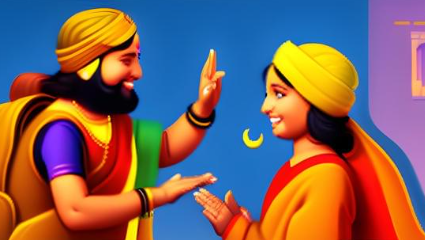Aryans Bring Changes to India
Why Did the Aryans Move to India?
Aryans were a group of people who lived in Central Asia
They decided to move to a new place, and they chose India
They may have moved to find better places to live and farm or to explore new places
India was beautiful with lots of rivers, mountains, and forests
They liked it so much that they decided to stay and make it their home
Over time, they became part of the culture and traditions of India, and helped create its rich history

Aryan's Religion and Hinduism
The Aryan religion was polytheistic, which means they worshipped many gods and goddesses
They believed in a supreme god called Indra who was the god of war and storms
The Aryan religion also included rituals, sacrifices, and hymns to their gods
The Vedas, a collection of sacred texts, were written by the Aryans and contained their religious beliefs and practices
Hinduism is a religion that developed in India, and it has been influenced by the Aryan religion
The Vedas are considered the earliest sacred texts of Hinduism, and they contain hymns, prayers, and rituals that are still used in Hinduism today
Many Hindu gods and goddesses, such as Indra, Agni, and Soma, were originally part of the Aryan religion
The caste system, which is a social hierarchy in India, was also influenced by the Aryan religion and is still a part of Hinduism today
India's Caste Classification
Caste classification in India is a sensitive and complex topic. However, here are some key points related to the caste system:
The caste system is a social hierarchy that divides people into different groups based on their birth.
The four main castes are Brahmins (priests and scholars), Kshatriyas (warriors and rulers), Vaishyas (merchants and traders), and Shudras (laborers and artisans).
Below the Shudras are the Dalits (formerly known as “untouchables”), who are considered outside of the caste system and historically faced severe discrimination and social exclusion.
Each caste has its own traditions, customs, and rules that govern its members’ behavior and interactions with others.
The caste system has been officially abolished in India, but its social and cultural influence still persists in many parts of the country.
Gautama's Search for Truth
-
Gautama was a prince who lived in ancient India around 2,500 years ago.
-
He left his comfortable life to search for truth and meaning in the world.
-
He taught that enlightenment can be achieved by anyone who follows the Eightfold Path and that this leads to a state of inner peace and freedom from suffering.
-
He also taught that all beings are interconnected and that compassion and kindness towards others are important aspects of the path to enlightenment.
-
His teachings were compiled into the Tripitaka, which is a sacred text for Buddhists.


